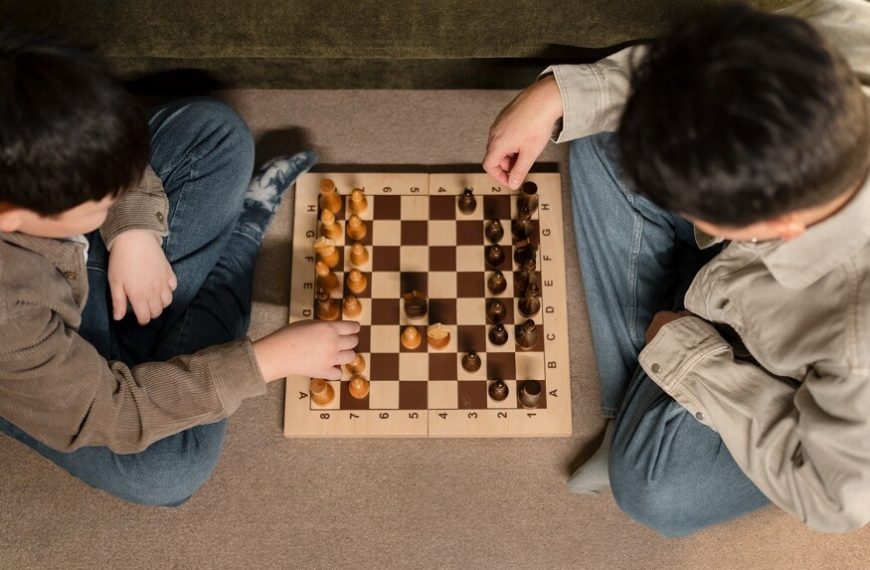Unlocking the Benefits: Chess for Kids – Cognitive Growth, Focus, Problem-Solving
Different games play different roles in the growth and development of kids. The benefits of chess for kids certainly include improved cognitive skills. Kids playing chess are seen to have more concentration and focus. One of the benefits of playing chess is time management. Strategic thinking, analytical skills, predicting scenarios, enhanced confidence, etc., are other benefits of chess for students.
Chess, a game of strategy and concentration, is an excellent way for children to develop essential skills while having fun! It teaches children to think and plan ahead as they strategize and make decisions. Both children and adults who play Chess regularly are known to have benefits of playing chess, like- multitasking, memory recall, and critical analysis.
One of the significant benefits of chess for kids is their intellectual growth. Kids can develop their leadership qualities by running the game. They’ll also learn how to make quick and decisive moves while understanding consequences – all while developing self-control that will serve them well in adulthood.
In this article, we will look at the 7 benefits of Chess for kids so that you can motivate your child to invest some time learning this smart and fun game.
Cognitive Benefits of Chess for Kids
Benefits of playing chess for kids have various cognitive effects on them, such as critical thinking, analytical skills, and problem-solving. Because of the tactical and strategic nature of the game, it allows your child to think and plan ahead to determine the best course of action. This helps them develop their cognitive abilities, problem-solving skills, and agility in making decisions in challenging situations.
Enhancing Problem-Solving Skills With Chess
Kids playing chess is a great way to teach them problem-solving skills. Not only do they learn to analyze the board and plan ahead, but they also have to think ahead of their opponents to stay on. Chess teaches strategic planning, developing the ability to think step by step and plan for contingencies, an invaluable skill in later life. It teaches logic and reason, understanding patterns, making decisions under pressure, and strengthening mental acuity. It helps them understand how different things fit together and how choices can be made while considering various scenarios.
Chess and Focus Development in Kids
Benefits of chess for students include enhanced focus – that will benefit them long-term. The benefits of playing chess are that it builds a sense of accomplishment as they progress on the board, potentially steering them towards setting and achieving goals outside of the game. When kids playing chess make moves on the chessboard, they must focus entirely on their next step and then plan ahead to anticipate opponents’ moves – this encourages imagination, critical thinking, and creativity. While concentration helps with decision-making on the board, it also helps kids with problem-solving skills outside the chessboard.
The Social Benefits of Chess for Kids
The benefits of chess for kids are innumerable as this activity is not just for improving their cognitive development but also for developing these social skills:
- Developing empathy
Chess is a two-person game, so when children play against each other, they practice how to interact with their opponents. They learn to use strategy and tactics to win the game while showing respect and understanding. This teaches children empathy, as they can experience the emotions and feelings of their opponents when they play.
- Building relationships with peers
Kids playing chess are further encouraged to work collaboratively with their peers. The game requires compromise – sometimes, players must sacrifice a piece or forfeit a move to keep the fun going – which teaches kids about mutual respect, negotiation, and center.
Strategic Thinking Development With Chess
It is no surprise that chess has been proven to help children’s academic performance. Research even shows that benefits of chess for kids include improvement in academic scores. Kids playing chess score significantly higher grades in maths and science than their peers who do not play.
Studies have also revealed that the benefits of chess for kids include developing their brains in other areas too. For example:
- A two-year study found that after playing Chess for 12 weeks, kids’ intellectual development improved by 17%.
- Chess is also associated with increased fluid intelligence and abstract reasoning ability.
Lifelong Positive Habits Developed by Playing Chess
As an age-old strategy game, playing chess can instill lifelong positive habits in children. Here are some key benefits of chess for kids:
- Time Management
Chess teaches kids how to manage their time well and make decisions quickly — two essential skills that will benefit them in the future. During a match, every move counts; they must think ahead while taking into account all other possible scenarios that could occur due to their decision-making.
- Concentration Development
Playing Chess requires a high level of mental focus and concentration; kids need to pay attention to the board and plan out their moves carefully to stay ahead of their opponents. This practice develops their ability to concentrate on various tasks in school and everyday life.
Gaining Confidence Through Playing Chess
Chess also provides an outlet for competition positively by teaching kids how to play pretty and win or lose gracefully. As their confidence grows, so does their enthusiasm for the game – leading to even more determination with each successive match!
This newfound confidence can manifest in many ways. For example, chess players tend to have a more remarkable ability to focus on tasks more intently without getting distracted easily and become more creative problem solvers. Chess also helps children learn how to take risks and accept failure while teaching them perseverance and determination in facing obstacles.
Conclusion
Benefits of chess for kids (toddlers) and benefits of chess for students might be same in a generic way but at different age benefits of playing chess can be different. Kids playing chess from an early age tends to have a higher opportunity to sharpen their analytical abilities and hone their mental and emotional discipline. While there are many other ways to support a child’s development, chess is one activity that provides a unique combination of educational and recreational value. And with the growing popularity of benefits of chess for kids more and more parents are encouraging their little ones to play chess.
At Eurokids, we help your kids engage in outdoor as well as indoor games like chess, ludo, etc. Contact us to enquire about our curriculum and co-curricular activities, or visit the nearest Eurokids center today to learn more about preschool admissions.















